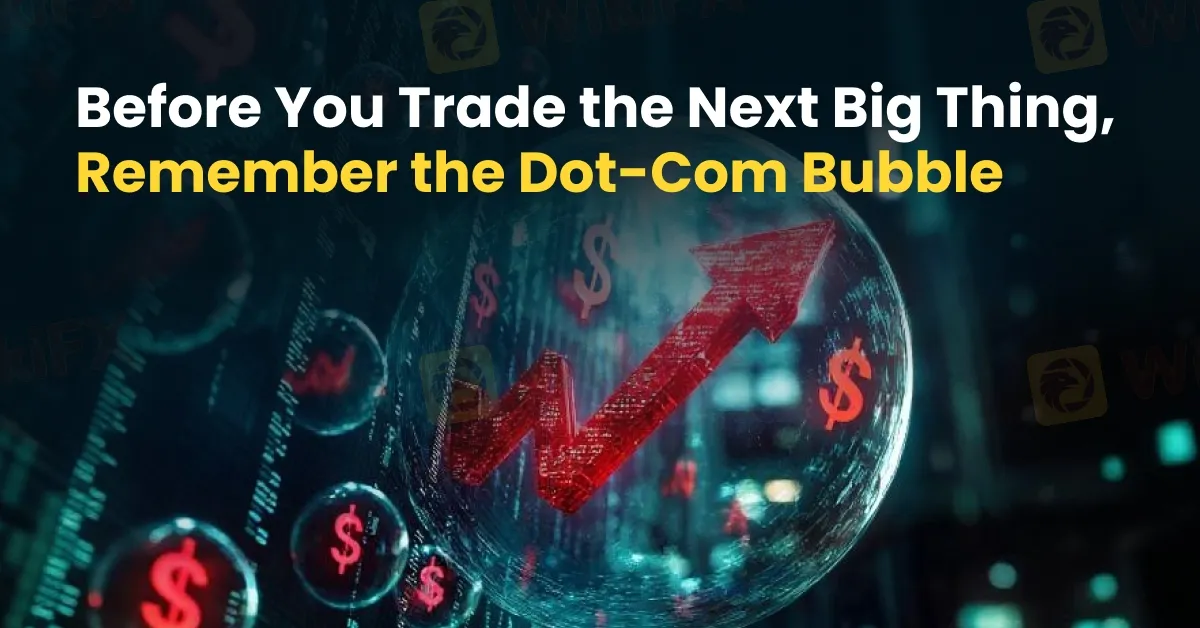Before You Trade the Next Big Thing, Remember the Dot-Com Collapse
Abstract:What if everything you’re investing in now echoes the deadly mistakes of the dot-com era? Learn why traders who ignore history are setting themselves up for catastrophic losses.

The dot-com bubble of the late 1990s and early 2000s remains one of the most vivid financial manias in modern history. It was a time of euphoria, speculation, and unchecked optimism surrounding internet-based businesses. But as quickly as it inflated, the bubble burst, leaving behind a trail of bankruptcies, disillusioned investors, and invaluable lessons for traders and investors today.
The dot-com era was driven by the explosive growth of the internet and the belief that traditional business models were obsolete. Start-ups with little more than a website and a “.com” in their name attracted millions in venture capital. By 1999, the Nasdaq Composite Index, dominated by technology stocks, had more than doubled. Companies such as Pets.com and Webvan reached billion-dollar valuations without turning a profit.
This speculative frenzy was fuelled by a fear of missing out (FOMO) and a widespread belief that the internet would fundamentally and immediately change the global economy. While the internet indeed revolutionised business, the timeline and costs were grossly misunderstood.

By March 2000, the party was over. The Nasdaq peaked at over 5,000 points before plummeting nearly 80% over the next two years. Between 2000 and 2002, investors lost an estimated $5 trillion in market value. Notably, high-flying stocks such as Cisco, Intel, and Amazon saw their valuations collapse (for example, Amazons share price dropped from $107 to just $6 by 2001), although it would eventually recover and thrive.
Key Lessons for Modern Traders and Investors:
- Valuations Matter: One of the most glaring errors during the dot-com boom was the disregard for traditional valuation metrics. Many traders invested in companies without revenue, let alone profits. Valuations based on hope rather than fundamentals are rarely sustainable.
- Beware of Hype Cycles: Like all bubbles, the dot-com craze was propelled by hype. Media coverage and herd mentality encouraged irrational exuberance. Traders should be wary of narratives that promise exponential returns without solid backing.
- Diversification Is Critical: Investors who had overexposed themselves to tech stocks suffered catastrophic losses. A diversified portfolio can protect against sector-specific downturns and market shocks.
- Time in the Market Beats Timing the Market: While many tried to “ride the wave,” most were caught when the tide turned. Long-term investors who maintained discipline and avoided speculation often fared better than short-term traders chasing trends.
- Innovation Alone Isnt Enough: Even transformative technologies take time to mature. Traders must differentiate between groundbreaking ideas and viable, investable businesses.
Two decades on, the echoes of the dot-com bubble can be heard in the rise of cryptocurrencies, meme stocks, and AI-driven ventures. While markets evolve, human behaviour often does not. For traders and investors alike, the lessons from the early 2000s are as relevant as ever.
In the fast-paced world of online trading, remembering the past is often the best way to protect the future.

#MarketAnalysis #MarketInsights #GlobalMarket
Read more

Why Investors Are Focusing on the US Bond Market Right Now
The US bond market's recent volatility is raising concerns. Learn why investors are paying close attention and how it may affect US tariffs and the economy.

No Recession in Forex? Is Forex Better Than the Stock Market?
As equity markets recently convulse under the pressure of rate uncertainty, geopolitical risk, and weakening macroeconomic signals, an age-old question resurfaces: when the stock market shakes, is it time to look elsewhere?

Super Micro Computer Eyes $40B Revenue by Fiscal 2026 Amid Challenges
Super Micro Computer targets $40B revenue by fiscal 2026 despite slashed 2025 guidance and Nasdaq delisting risks. Shares surge 10%.

Webull Review 2025: Pros and Cons Revealed
Webull was founded in 2017, quite newer to the brokerage industry than traditional players like Charles Schwab, Fidelity, Interactive Brokers and Robinhood. However, it stands tall when it comes to products offerings: Stocks, Options, cryptos, Index Options, Futures, ETFs, OTC, Margin, Fractional Shares. Webull applies no commission on stock, options and ETFs trading listed on U.S. Exchanges.
WikiFX Broker
Latest News
Love, Investment & Lies: Online Date Turned into a RM103,000 Scam
Broker Took 10% of User's Profits – New Way to Swindle You? Beware!
Pi Network: Scam Allegations Spark Heated Debate
Broker Comparsion: FXTM vs AvaTrade
Account Deleted, Funds Gone: A New Broker Tactic to Beware Of?
Broker’s Promise Turns to Loss – Funds Disappear, No Compensation!
El Salvador and U.S. Launch Cross-Border Crypto Regulatory Sandbox
The Instagram Promise That Stole RM33,000
StoneX Subsidiary, Gain Global Markets Bermuda, Penalized for Trading Misconduct
Kraken Partners with Alpaca to Offer U.S. Stocks and Crypto
Rate Calc
